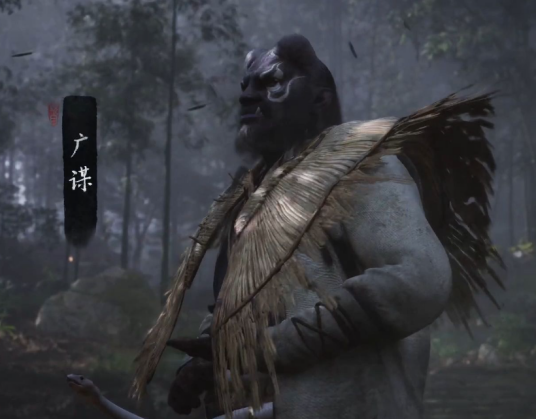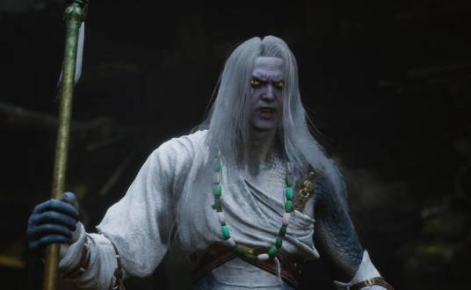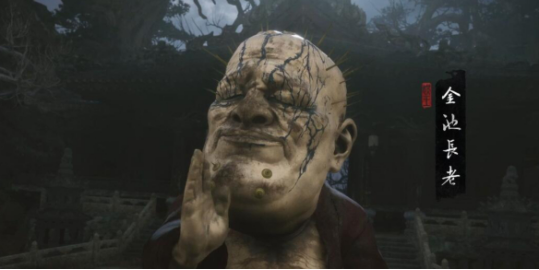Black Myth: Wukong Episode One – Bamboo grove
In the first episode of “Black Myth: Wukong” titled “Bamboo Grove”, the Destined One will encounter various characters including the feng shui master Yuan Shoucheng, the Snake Guai Guangmou, the Baw-Li-Guhh-Lang, the Whiteclad Noble, and the Elder Jinchi.

Why, in the game, does Yuan Shoucheng carry a gourd on his back and teach the skill of gourd refining?
Actually, Yuan Shoucheng is a feng shui master known for his remarkably accurate fortune-telling. In the ninth episode of “Journey to the West”, Yuan Shoucheng is described as having a distinctive appearance and an elegant demeanor, with the ability to foresee the future and expertly interpret the balance of yin and yang. He became famous for betting with the Loong King of the Jing River.
- The Loong King, believing himself to be the divine loongin charge of rain, could not fathom how a mere mortal like Yuan Shoucheng could predict the weather more accurately than he could. Confident of victory, the Loong King returned to his river palace, only to find that the heavens had decreed rain in Chang’an exactly as Yuan had predicted, right down to the timing and amount. Shocked by Yuan’s prophetic abilities, the Loong King, stubborn and competitive to a fault, decided to secretly change the timing and amount of the rain. The next day, after altering the rain’s schedule and quantity, the Loong King transformed into human form and went straight to Yuan Shoucheng’s Fortune-telling Stall, smashing it to pieces and demanding that Yuan leave Chang’an immediately.
- Yuan Shoucheng quietly watched the loongKing wreak havoc on his stall and then sneered coldly, saying, “My humble Fortune-telling Stall is not worth much, but it seems someone has committed a capital offense without realizing it. I recognize you—you are the Jing River loongKing. You tampered with the hour and hoarded rainfall, violating the heavenly laws. Tomorrow, I fear you cannot escape the blade!” This realization sent the Jing River loong King into a panic, regretting his impulsive actions. He immediately knelt down and begged Yuan Shoucheng to save his life.
- Yuan Shoucheng sighed, “Pleading with me is futile. Tomorrow, you are to be executed by Wei Zheng, the current Prime Minister. If you could seek favor from the Emperor of the Tang Dynasty, you might find a way to survive.” Terrified, the Jing River loongKing went to plead for his life with Emperor Li Shiminof the Tang Dynasty. Although Li Shimin agreed to help the loong King and kept Wei Zheng in the palace playing chess to delay the execution, Wei Zheng still managed to slay the Jing River loong King in a dream. Unwilling to accept his fate, the Jing River loong King visited Li Shimin in a dream, ultimately dragging his soul to the Underworld for a confrontation. However, since Li Shimin’s time of death had not yet come, his soul was returned to his body, whereas the soul of the Jing River loong King was forcibly sent into the cycle of reincarnation. This story underscores the profound spiritual power and flawless foresight of Yuan Shoucheng, thus it is no surprise that he is revered in the game as a master who imparts the skill of gourd alchemy to players.

After bidding farewell to Yuan Shoucheng, the Destined One encountered the Yaoguai leader, Guangmou. In the game, Guangmou is a Snake Guai, unlike his senior brother Guangzhi, who aspired from a young age to become the greatest Yaoguai king of all time. In the original “Journey to the West,” when the White Flower Serpent Spirit saw that Lingxu Zi had sent his disciple (the Wolf Guai) to the Guanyin Monastery to become a monk (Guangzhi), she ordered Guangmou to also take monastic vows. However, no matter how hard Guangmou tried, Elder Jincheng never favored him as he did Guangzhi. When Tang Seng and Sun Wukong arrived at the Guanyin Monastery, Elder Jincheng, tempted by the Kasaya, contemplated murder and theft. Guangzhi, in gratitude, offered a strategy to Elder Jincheng, and Guangmou then added a ruthless twist to the plan—setting a fire. After presenting their strategy, sensing impending disaster, Guangmou used a whirlwind to escape into the bamboo forest behind the mountain, disappearing from sight. It was not until later, when he encountered the Destined One, that he was ultimately vanquished.

Next, the Destined One met Baw-Li-Guhh-Lang, an original character from the game, a toad spirit and the leader of the Black Wind Mountain marsh. This character does not appear in the original “Journey to the West.” The name Baw-Li-Guhh-Lang is similar to that of the minor Guai Benborba in the original text, serving as Game Science’s homage to “Journey to the West.”

Subsequently, the Destined One encountered Whiteclad Noble, newly appointed by the Black Wind King, who shared the title with the previous Whiteclad Noble, the White Flower Snake Guai, slain by Sun Wukong, but was not the same individual.
In the misty White Mist Marsh of the verdant bamboo forest, a scholar clad in white will block the path of the Destined One. This scholar in white does not appear in “Journey to the West,” nor is he a yaoguai associated with the “Guanyin Zen Temple.” Why then, would the game invent such a character and endow him with formidable powers? The answer is quite straightforward: the scholar’s real identity is no simple matter—he is the brother of Erlang Shen, Yang Jian.
In the game, after the players defeat the scholar in white, he reveals, “It was my elder brother who asked me to serve as an insider here, feigning obedience to guard the mountain pass behind the bear.” This statement indicates that the scholar in white has no connection with the previously encountered black bear spirit. He was following the orders of his “elder brother” specifically to act as an insider, with the likely purpose of testing the Destined One.
Later in the story, after players defeat Yang Jian, he too mentions, “I sent my brothers to test you all along the way, all for this moment.” Clearly, the scholar in white is one of the “brothers” referred to by Yang Jian, positioned under the black bear spirit as an insider on Yang Jian’s orders. Yang Jian is the “elder brother” mentioned by the scholar in white. Thus, the true identity of this scholar in white is Chang Hao, one of the Six Monsters of Mei Mountain, acting under the commands of Erlang Shen, Yang Jian, to test the Destined One. In mythology, Yang Jian has many brothers, among whom the most famous and closest are the Six Monsters of Mei Mountain, who once swore brotherhood with Yang Jian, collectively known as the “Seven Saints of Mei Mountain.”

Finally, players encounter Elder Jinchi. Elder Jinchi is a character from “Journey to the West” and the venerable abbot of the Guanyin Temple, who was 270 years old. Driven by a momentary greed to burn Tang Seng alive and seize his magnificent Kasaya, he ends up suffering the consequences of his actions, accidentally burning down the temple. Ashamed and unable to face anyone, he hides in the ruined temple and eventually dies by running into a wall.
In the game, even after his suicide, Elder Jinchi remains trapped in his obsessions. Although revived by the Black Bear Guai, his body transforms into a wandering ghost in the wilderness, while his spirit, upon being defeated by the Destined One, finally lets go of his obsessions. He cries out, “I don’t want the Kasaya anymore, stop burning it, stop burning it,” and is successfully liberated.
At the end of the chapter, Game Science uses an animation to illustrate the life of Elder Jinchi. Starting from his childhood friendship with the Black Bear Guai, he climbs to the pinnacle of his life, only to lose everything—the Guanyin Zen Temple, his disciples, and his own life—because of a moment of greed.
The Black Bear Guai asks Guanyin, “Having renounced worldly ties and the ocean of suffering dried up, why does the elder cling to a piece of clothing?”
Guanyin replies, “Without this garment, how would the world know that I have severed my worldly ties and the ocean has dried up?”
The splendor of the Kasaya is meant to communicate to the world that the person wearing it is of noble status and high moral standing, with its luxurious appearance emphasizing the practitioner’s inner purity and resolve. Conversely, Elder Jincheng’s fixation on the magnificent Kasaya itself actually reveals his inability to relinquish his attachment to external objects. He believes that only by wearing the splendid Kasaya can he signify his esteemed status and only then will people recognize his profound contributions. This is a case of missing the essence for the form; the Kasaya itself holds no meaning. It is only through one’s virtuous character that they can truly gain the respect of others, a lesson that inevitably shapes his ultimate fate.
